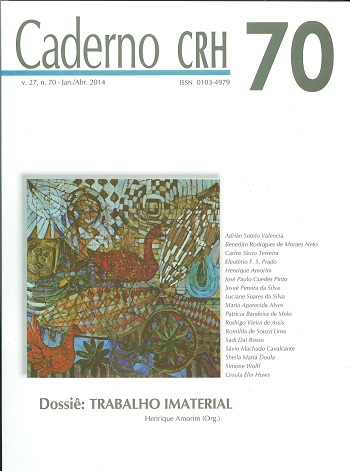VIDA, TRABALHO E VALOR NO SÉCULO XXI: desfazendo o nó
DOI:
https://doi.org/10.9771/ccrh.v27i70.19628Resumo
Costuma-se argumentar que a teoria do valor-trabalho de Marx não mais se aplica ao mundo contemporâneo, em que partes crescentes da população estão envolvidas em trabalho “imaterial” ou trabalho “digital”. Este ensaio argumenta que essa teoria ainda é relevante, mas que, a fim de entender como ela pode ser aplicada ao trabalho imaterial e ao trabalho de modo mais geral, é necessário analisar criticamente os três principais componentes da teoria: a natureza particular de qualquer forma de trabalho, o valor que é criado por esse trabalho e os meios de subsistência do trabalhador. Essa análise nos permite não apenas distinguir entre “tempo de trabalho necessário” e mais-valia, mas também identificar o local de produção. Em um mundo em que novas atividades estão sendo constantemente trazidas para dentro da esfera das relações sociais capitalistas e novas mercadorias sendo produzidas, é importante identificar esses locais de produção e os trabalhadores que estão diretamente envolvidos na produção de mais-valia, porque são esses trabalhadores que têm o potencial, ao retirar seu consentimento, de se organizar de forma eficaz junto aos interesses comuns da classe trabalhadora global.
PALAVRAS-CHAVE: Teoria do valor trabalho. Trabalho imaterial. Mercadorização. Monetarização da internet. Trabalho. Trabalho digital. Trabalho produtivo e improdutivo.
LIVING, LABOUR AND VALUE IN THE XXIST CENTURY: unpicking the knot
Ursula Elin Huws
It is often argued that Marx’s labour theory of value no longer applies in the contemporary world in which increasing proportions of the population are involved in “immaterial” or “digital” labour. This article contends that the theory is still relevant, but that in order to understand how it can be applied both to immaterial labour and to labour more generally, it is necessary to examine critically the three key components of the theory: the particular nature of any given form of labour, the value that is created by that labour, and the worker’s means of subsistence. Such an analysis enables us not only to distinguish between “necessary labour time” and surplus value but also to identify the point of production. In a world in which new activities are constantly being brought within the sphere of capitalist social relations and new commodities are being produced, it is important to identify these points of production and the workers who are directly engaged in the production of surplus value because it is these workers who have the potential, by withdrawing their consent, to organise effectively in the common interests of the global working class.
KEY WORDS: labour theory of value, immaterial labour, commodification, monetisation of the Internet, labour, digital labour, productive and unproductive labour.
LIVING, LABOUR AND VALUE IN THE XXIST CENTURY: unpicking the knot
Ursula Elin Huws
It is often argued that Marx’s labour theory of value no longer applies in the contemporary world in which increasing proportions of the population are involved in “immaterial” or “digital” labour. This article contends that the theory is still relevant, but that in order to understand how it can be applied both to immaterial labour and to labour more generally, it is necessary to examine critically the three key components of the theory: the particular nature of any given form of labour, the value that is created by that labour, and the worker’s means of subsistence. Such an analysis enables us not only to distinguish between “necessary labour time” and surplus value but also to identify the point of production. In a world in which new activities are constantly being brought within the sphere of capitalist social relations and new commodities are being produced, it is important to identify these points of production and the workers who are directly engaged in the production of surplus value because it is these workers who have the potential, by withdrawing their consent, to organise effectively in the common interests of the global working class.
KEY WORDS: labour theory of value, immaterial labour, commodification, monetisation of the Internet, labour, digital labour, productive and unproductive labour.
Publicação Online do Caderno CRH no Scielo: http://www.scielo.br/ccrh
Publicação Online do Caderno CRH: http://www.cadernocrh.ufba.br
Downloads
Downloads
Publicado
Como Citar
Edição
Seção
Licença
Todo o conteúdo da revista, exceto onde indicado de outra forma, é licenciado sob uma atribuição do tipo Creative Commons BY.
O periódico Caderno CRH on-line é aberto e gratuito.





